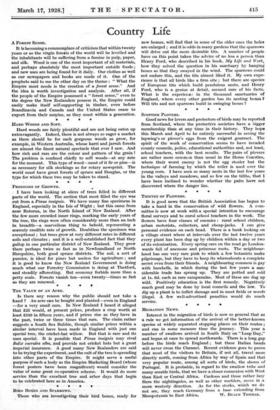THIEVES OF FLOWERS.
It is good news that the British Association has begun to take a hand in the conservation of wild flowers. A com- mittee is now at work with a special intention to encourage floral surveys and to enrol school teachers in the work. The flowers have four classes of enemies : rural school children, urban motorists, collectors, and cheap-jacks. I can give personal evidence on each head. There is a bank looking on a village street where at intervals over the last twelve years every plant has been dug up by children within a day or two of its colonization. Every spring ears on the road go London- wards full of anemone and primrose roots. The neighbour- hood has one very rare pink to which a few botanists make pilgrimage, but they have to keep its whereabouts a complete secret even from their friends. A neighbouring common is gay with harebells, in which during the last few years a CCM. siderable trade has sprung up. They are potted and sold at Is. 6d. each as rare campanulas. Most of these are dug up wild. Positively education is the first remedy. Negatively much good may be done by local councils and the law. To dig up a plant is to inflict damage and in most fields or woods illegal. A few well-advertised penalties would do much
service.










































 Previous page
Previous page